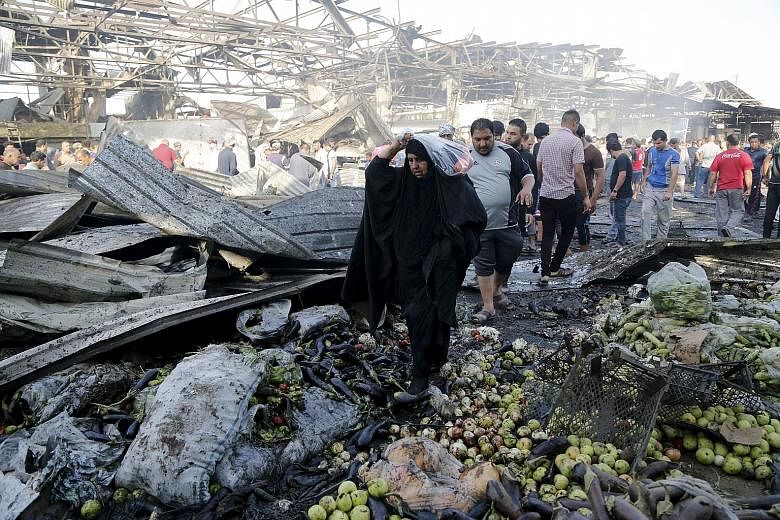BAGHDAD • A truck bombing claimed by the Islamic State in Iraq and Syria (ISIS) killed at least 54 people in a Shi'ite-majority area of Baghdad, in the deadliest single attack to hit the city in months.
The blast yesterday, which was likely aimed at undermining confidence in the government and stoking sectarian tensions, came after the outgoing United States army chief warned that reconciliation in Iraq was becoming increasingly difficult.
The bomb went off in a wholesale vegetable market in the Sadr City area of north Baghdad at around 6.00am, the peak time for retailers buying vegetables for the day. A police colonel said 38 bodies and the remains of nearly 12 more people had been found. A medical official gave an even higher toll, saying 59 people had died.
Both officials said the blast also wounded 82 people.
The bombing devastated the market, ripping through buildings, killing horses used to transport vegetables, burning vehicles and leaving large amounts of produce scattered on the ground.
Sunni militant group ISIS claimed responsibility for what it termed the "blessed operation" in a statement posted online.
Bombings, such as the Sadr City attack, are a significant source of tension in Iraq and have worsened the country's sectarian divide.
General Raymond Odierno, who served as the top US commander in Iraq from 2008 to 2010, said on Wednesday that the country may ultimately have to be divided up.
Asked if he saw any possibility of reconciliation between Iraqi Sunnis and Shi'ites, Gen Odierno said that "it's becoming more difficult by the day" and pointed to a future in which "Iraq might not look like what it did in the past".
When asked about partition, he said: "I think that is for the region and politicians to figure out, diplomats to figure out how to work this, but that is something that could happen."
"It might be the only solution but I'm not ready to say that yet," said Gen Odierno.
Iraq has three main communities that would likely form the basis for the partition of the country if that were to occur: the Kurds, who already have an autonomous region, and the Sunni and Shi'ite Arabs.
Kurds dominate the country's north, and Shi'ites the south, while the Sunni Arab population is distributed across western, northern and central Iraq.
ISIS overran large parts of Iraq in June last year and also holds significant territory in neighbouring Syria.The Iraqi army, which the US spent billions of dollars to train and equip, performed dismally in the early days of the ISIS offensive. They have since regained ground with backing from a US-led coalition and Iran, but much of the country's west remains outside government control.
Even before the ISIS offensive, bombings targeting civilians in Iraq were a major threat, killing hundreds of people a month.
Although the frequency of blasts has declined since ISIS launched its offensive elsewhere, bombings are still the signature tactic of ISIS, with the group planting explosives to help defend areas it holds and deploying suicide bombers.
The Baghdad blast came two days after bombings in Diyala province, north-east of the capital, which killed more than 30 people.
A massive suicide attack in the province killed more than 120 last month, one of the deadliest single bombings in Iraq since the 2003 US-led invasion.
AGENCE FRANCE-PRESSE

